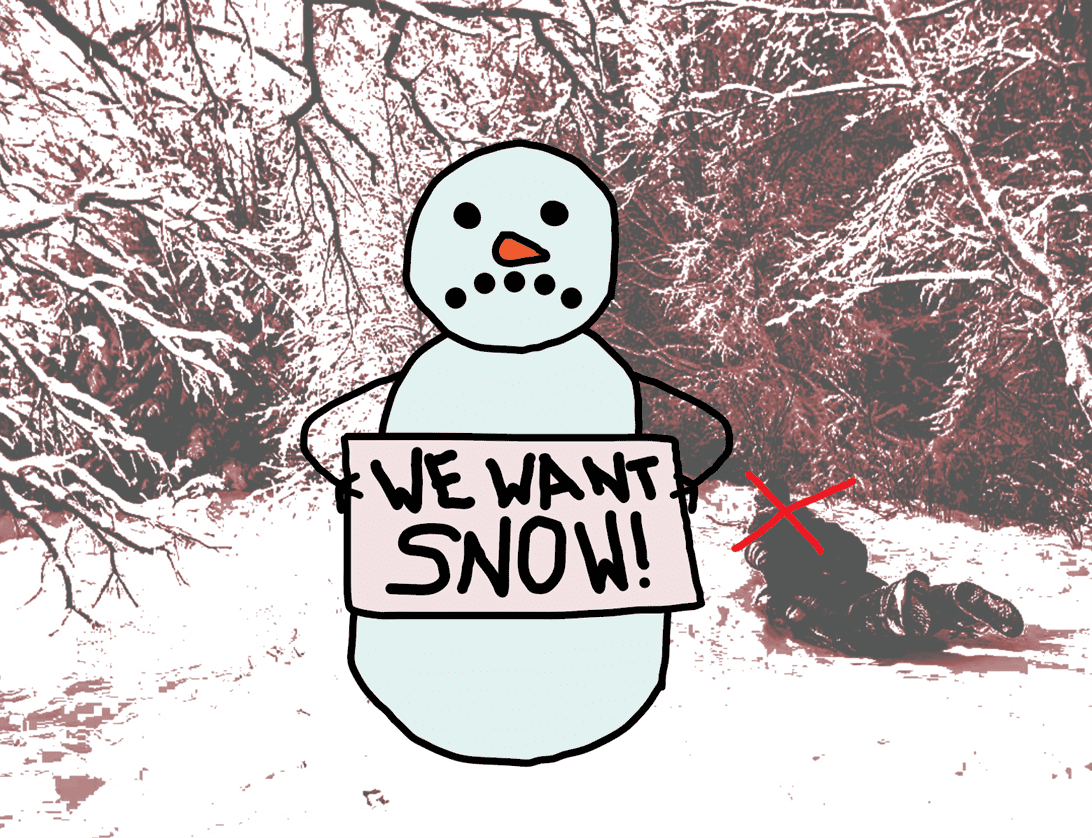The semester is rolling to a close, and as one does at the end of any school year while living on-campus, that means it is time to start thinking about packing up one’s things.
So planning I began. Scanning the apartment, I looked to take only the small and unnecessary things that one doesn’t need as spring comes to bloom here at Montclair State University.
I looked around my room and I noticed that there was a pair of shoes that, evidently, hadn’t moved since I placed them there late last semester.
They were a pair of battle-hardened snow boots that I had brought in preparation for the winter storms that I know Montclair State can produce. They had seen no combat this season. The light and sad dustings of this so-called winter didn’t warrant their use, so alas, here they sat, alone until nearly May.
I love winter. Maybe it was the years spent growing up on ski slopes, or the comfort and joy that came with an unexpected delayed opening before school. Whenever snow is in the forecast, there is a childlike whimsy that falls over me even at twenty-one years old, and I can’t think of anything better to do but embrace every moment of a beloved blizzard. Earlier this year, back in mid-December, when our first snowfall was forecast, that’s what I did.
Once the snow had accumulated and there was a little more than an inch or so of snow sticking on the ground, my roommates and I rushed downstairs to build the first snowman of the season. Yes, I still build snowmen.
Little did I know, that would be the only measurable snowstorm of the season, and my boots weren’t even here yet. Since that singular day, this mild winter has resulted in the lowest recorded season of snow in nearly eight decades for much of the tri-state area.
For as long as I’ve been a resident on campus, throughout move-ins and mid-terms of the spring semester, there has always been that chilly overhang of wonder and concern as to whether or not we’d be able to trek to class week to week.
In my freshman year alone, the spring of 2021, I can recall what seemed like mountains of snow which didn’t dissipate in its entirety until nearly the dying days of April.
What happened to winters like this?
According to NBC New York 4 and The National Weather Service, this is the current trend as per the influence of climate change.
To put it frankly, while temperatures may drop to record lows on occasion like seen at Christmas of last year, the influence of temperature increase across the world results in the apparent lack of snow in the lower North Eastern United States.
Climate change is not a phrase that has gone unheard. It is a buzz phrase and rallying cry for those both young and old across the country and globe. Many young people for decades have been announcing the arrival of global warming effects and what it will do to more than just the rise of temperatures. Unfortunately, lacking snow is not the first nor worst thing that climate change has brought to our attention.
Many opposition leaders who rail against the worsening effects of our changing climate only talk about rising temperatures and advancing shorelines. Simply, they look past and remain ignorant of the apparent and rapidly occurring effects of this environmental disruption. According to a United Nations IPCC report, there is already significant damage and cost to human life as a result of global warming.
This is not a hyperbole.
That report detailed by WHYY states, “Already at least 3.3 billion people’s daily lives ‘are highly vulnerable to climate change’ and 15 times more likely to die from extreme weather, the report says. Large numbers of people are being displaced by worsening weather extremes. And the world’s poor are being hit by far the hardest.”
Although we as young people and college students are not all climate experts or practiced meteorologists, we still see and experience what has been happening as a result of unfettered global climate change and despite some nations, corporations and philanthropists having thrown some cash at the issue in a false attempt at appeasement, the wake of this problem is at our doorstep regardless. The effects will reign far more detrimental than some grassy ski slopes this winter season.
Despite this, there are certainly minor ways to influence change on a local level.
Such actions like calling local political leaders and acting on cleaner ways to commute to and from work or class won’t change how much or how little snow we get next season, but making those around us aware and conscious of this existential threat we face as both a global village and campus-community can help sway the vastly important civilian consciousness of the issue at hand which will, with any luck, sway how we teach, react and vocalize climate issues to our current and next generation of leaders before it is beyond repair.



